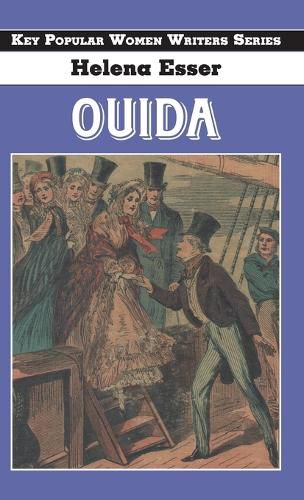Readings Newsletter
Become a Readings Member to make your shopping experience even easier.
Sign in or sign up for free!
You’re not far away from qualifying for FREE standard shipping within Australia
You’ve qualified for FREE standard shipping within Australia
The cart is loading…






This title is printed to order. This book may have been self-published. If so, we cannot guarantee the quality of the content. In the main most books will have gone through the editing process however some may not. We therefore suggest that you be aware of this before ordering this book. If in doubt check either the author or publisher’s details as we are unable to accept any returns unless they are faulty. Please contact us if you have any questions.
This new study of Marie Louise de la Ramee (1839-1908), who wrote under the pseudonym Ouida, considers the best-selling Victorian author's vivid, evocative work and especially the complex, even complicated ways in which she envisions and portrays gender.
Ouida's oeuvre, which includes non-fiction, short stories, and around forty novels over a forty-year writing period, and which was translated into more than ten foreign languages, is as diverse and unpredictable as the writer herself. She considered herself a francophile and cosmopolitan, moved from a London salon to a Florentine villa, and remained unmarried and self-supporting. Her work, which was admired by such contemporaries as John Ruskin, Oscar Wilde, and Marie Corelli, and which earned her a reputation as 'the English Zola', was noted for its vivid prose, high drama, and causal disregard for established moral conventions, particularly regarding gender. In turns associated with sensation fiction, social critique, and aestheticism, her novels' unifying trait is that they defied, and continue to defy, expectations.
Ouida wrote a critical desert adventure decades before the generations of Rider Haggard, General Gordon, or T.E. Lawrence. She satirised the marriage market and its social conventions, in turns bitterly and brilliantly funny, in her 1880 novel 'Moths', before the advent of New Woman fiction, a term she helped coin even as she remained critical of the figure. She had high moral standards for her characters, yet sent female spies and soldiers, and a multitude of happy adulteresses adventuring across European high society, without subjecting them to Victorian narrative justice that haunts the Fallen Woman. She willingly portrayed social taboos such as extramarital affairs, blackmail, or marital abuse, in her highly stylised and entertaining novels.
This study discusses Ouida's life and reception as a popular female author, skilful narrator, and fierce libertarian.
$9.00 standard shipping within Australia
FREE standard shipping within Australia for orders over $100.00
Express & International shipping calculated at checkout
This title is printed to order. This book may have been self-published. If so, we cannot guarantee the quality of the content. In the main most books will have gone through the editing process however some may not. We therefore suggest that you be aware of this before ordering this book. If in doubt check either the author or publisher’s details as we are unable to accept any returns unless they are faulty. Please contact us if you have any questions.
This new study of Marie Louise de la Ramee (1839-1908), who wrote under the pseudonym Ouida, considers the best-selling Victorian author's vivid, evocative work and especially the complex, even complicated ways in which she envisions and portrays gender.
Ouida's oeuvre, which includes non-fiction, short stories, and around forty novels over a forty-year writing period, and which was translated into more than ten foreign languages, is as diverse and unpredictable as the writer herself. She considered herself a francophile and cosmopolitan, moved from a London salon to a Florentine villa, and remained unmarried and self-supporting. Her work, which was admired by such contemporaries as John Ruskin, Oscar Wilde, and Marie Corelli, and which earned her a reputation as 'the English Zola', was noted for its vivid prose, high drama, and causal disregard for established moral conventions, particularly regarding gender. In turns associated with sensation fiction, social critique, and aestheticism, her novels' unifying trait is that they defied, and continue to defy, expectations.
Ouida wrote a critical desert adventure decades before the generations of Rider Haggard, General Gordon, or T.E. Lawrence. She satirised the marriage market and its social conventions, in turns bitterly and brilliantly funny, in her 1880 novel 'Moths', before the advent of New Woman fiction, a term she helped coin even as she remained critical of the figure. She had high moral standards for her characters, yet sent female spies and soldiers, and a multitude of happy adulteresses adventuring across European high society, without subjecting them to Victorian narrative justice that haunts the Fallen Woman. She willingly portrayed social taboos such as extramarital affairs, blackmail, or marital abuse, in her highly stylised and entertaining novels.
This study discusses Ouida's life and reception as a popular female author, skilful narrator, and fierce libertarian.